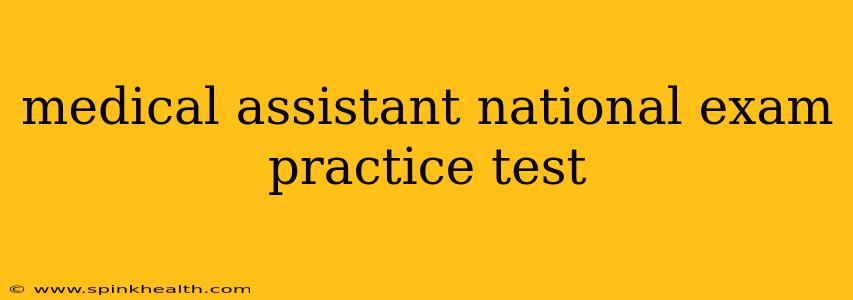Conquering the Medical Assistant National Exam: A Practice Test Journey
The day is finally here. You've poured over textbooks, completed countless practice questions, and honed your clinical skills. Now, the looming shadow of the Medical Assistant (MA) national exam hangs in the air. But fear not, aspiring MA! This isn't just about passing a test; it's about embarking on a fulfilling career dedicated to patient care. Let's transform your anxiety into focused preparation with a journey through practice test scenarios.
What's Covered on the Medical Assistant National Exam?
Before we dive into practice questions, let's get a clear picture of what to expect. The exam covers a broad spectrum of medical assisting knowledge and skills, including:
- Administrative tasks: Scheduling appointments, managing medical records, insurance processing, and handling patient communication.
- Clinical skills: Taking vital signs, assisting with examinations, preparing and administering medications (under supervision), performing basic lab tests, and understanding medical terminology.
- Medical law and ethics: Understanding HIPAA regulations, patient confidentiality, and professional conduct.
- Safety and infection control: Implementing proper sterilization techniques, following universal precautions, and ensuring a safe clinical environment.
Practice Scenario 1: The Tricky Appointment
Question: A patient calls to reschedule their appointment, citing a family emergency. What is the MOST appropriate action?
A) Reschedule the appointment without further questions. B) Ask for specifics about the emergency. C) Tell the patient they must provide a doctor's note for rescheduling. D) Refuse to reschedule the appointment.
Answer: A is the best choice. While empathy is key, pressing for details about a family emergency is intrusive. Options C and D are overly rigid and insensitive. Maintain professionalism and a compassionate approach.
Practice Scenario 2: Vital Signs and Observation
Question: You are taking a patient's vital signs. Their blood pressure is 160/100 mmHg, pulse is 100 bpm, and respirations are 24 breaths per minute. What should you do?
A) Record the vital signs and continue with the appointment. B) Inform the physician immediately. C) Tell the patient they are fine and don't need to worry. D) Repeat the measurements after 10 minutes and then inform the physician.
Answer: B is correct. These vital signs indicate potential hypertension (high blood pressure) and tachycardia (rapid heart rate). Immediate notification to the physician is crucial for prompt intervention.
How to Ace the Medical Assistant National Exam: Tips and Tricks
H2: How can I prepare for the medical assistant exam?
Preparing effectively for the MA national exam requires a multifaceted approach. Consistent study, using a variety of resources, is key. This includes textbooks, online courses, practice tests, and flashcards focusing on key concepts. Joining study groups can also provide peer support and diverse perspectives. Regular review of core concepts and consistent practice will greatly increase your confidence and preparedness. Focus not just on memorization, but also on understanding the underlying principles of each concept.
H2: What kind of questions are on the medical assistant exam?
The questions on the medical assistant exam encompass a wide range of question formats. Expect multiple-choice questions, some with detailed scenarios that require careful analysis to determine the best course of action. You’ll also encounter questions testing your knowledge of medical terminology, anatomy, physiology, and pharmacology. Strong comprehension of medical procedures and patient care protocols is essential. The questions are designed to assess your ability to apply your knowledge in real-world clinical scenarios.
H2: What resources are available to help me study for the medical assistant exam?
Many resources are available to aid your preparation. Consider exploring official study guides published by the certifying bodies offering the exam. Numerous online courses and platforms offer structured learning paths, practice tests, and interactive simulations. Medical assisting textbooks can provide in-depth explanations of key concepts. Don't underestimate the value of practice tests; they are invaluable for identifying areas needing further review and acclimating yourself to the exam format.
H2: What are the best practices for taking the Medical Assistant exam?
Approaching the exam strategically is crucial. Thorough preparation is the first step. On exam day, ensure you arrive early, get settled, and read the instructions carefully. Pace yourself, managing your time effectively to allocate sufficient time for each section. Don't dwell on difficult questions; move on and return to them later if time allows. Review your answers if time permits after completing the exam. Remember, deep breaths and a positive attitude can help manage test anxiety.
Conclusion:
The journey to becoming a Certified Medical Assistant is a rewarding one. By dedicating time to thorough preparation and utilizing diverse learning resources, you can confidently conquer the national exam and embark on a fulfilling career assisting healthcare providers and caring for patients. Remember, practice makes perfect! Good luck!

